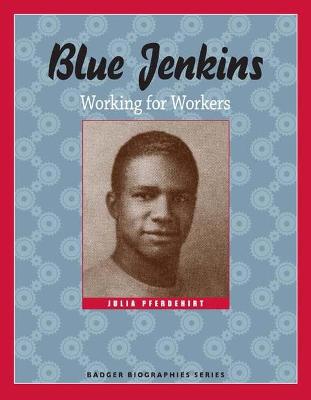Badger Biographies
2 total works
"When William "Blue" Jenkins was only six months old, he moved with his parents from a Mississippi sharecropper's farm to the industrial city of Racine, Wisconsin with dreams of a new life. As an African-American in the pre-civil rights era, Blue came face to face with racism: the Ku Klux Klan hung a black figure in effigy from a tree in the Jenkins family's yard. Growing up, Blue knew where blacks could shop, eat, and get a job in Racine--and where they couldn't. The injustices that confronted Blue in his young life would drive his desire to make positive changes to his community and workplace in adulthood. This addition to the Badger Biographies series shares Blue Jenkins's story as it acquaints young readers with African-American and labor history. Following an all-star career as a high school football player, Blue became involved in unions through his work at Belle City Malleable. As World War II raged on, he participated in the home-front battle against discrimination in work, housing, and economic opportunity. When Blue became president of the union at Belle City, he organized blood drives and fought for safety regulations. He also helped to integrate labor union offices. In 1962, he became president of the U.A.W. National Foundry in the Midwest, and found himself in charge of 50,000 foundry union members"--
"The story of Blue Jenkins, an African American who grew up in Depression-era Racine. Blue experienced, both personally and as a part of the black community near Milwaukee, the exodus of former farm laborers from the South seeking jobs in Northern manufacturing. He attended pre-civil rights movement public schools, and experienced racism: the Ku Klux Klan hung a black figure in effigy from a tree in the Jenkins family's yard. Jenkins played semi-pro "Negro League" baseball and was a teen during the Big Band era and the popularity of music from Harlem. Later, he integrated labor union offices and learned, first hand, about the battle against discrimination in work, housing, and economic opportunity. Jenkins organized a boycott of Woolworths and Kresge stores to protest "anti-Negro" hiring policies. After WWII he stood against Union efforts to lay off Caribbean Black employees to make room for returning White veterans, and worked in educating and training minorities as factory engineers"--
"The story of Blue Jenkins, an African American who grew up in Depression-era Racine. Blue experienced, both personally and as a part of the black community near Milwaukee, the exodus of former farm laborers from the South seeking jobs in Northern manufacturing. He attended pre-civil rights movement public schools, and experienced racism: the Ku Klux Klan hung a black figure in effigy from a tree in the Jenkins family's yard. Jenkins played semi-pro "Negro League" baseball and was a teen during the Big Band era and the popularity of music from Harlem. Later, he integrated labor union offices and learned, first hand, about the battle against discrimination in work, housing, and economic opportunity. Jenkins organized a boycott of Woolworths and Kresge stores to protest "anti-Negro" hiring policies. After WWII he stood against Union efforts to lay off Caribbean Black employees to make room for returning White veterans, and worked in educating and training minorities as factory engineers"--

